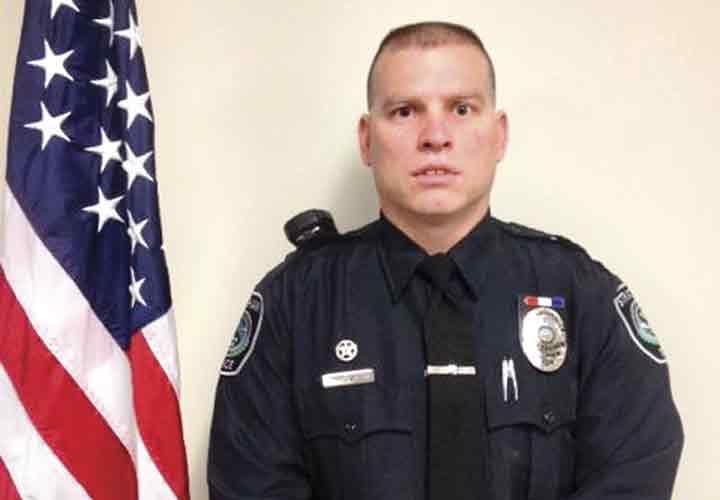Officer Chuck Law of the Stratham (N.H.) Police Department drove his cruiser directly into the line of fire during a barricade situation to evacuate two downed colleagues and get them treatment on April 12, 2012. Both men survived. For his actions, Law has been selected as the January 2013 Officer of the Month by the National Law Enforcement Officers Memorial Fund.
Law was in the Stratham PD booking room handling evidence when he heard a report of officers need assistance just before 6:30 that night. He grabbed his rifle and his tactical vest and went to the neighboring town of Greenland to help. "As I drove to the scene, I heard on the radio a crackle of, 'Gunfire,'" says Law. "It was a very eerie feeling."
What the officer found when he got there was unsettling as well. The State Attorney General's Drug Task Force had arrived at the residence of Cullen Mutrie to serve a search warrant as part of a drug investigation. The suspected drug dealer's response was to open fire and wound four officers.
By the time Law arrived, two men had been safely removed from the scene. The two remaining wounded officers were still in harm's way, pinned down by Mutrie's gunfire. And another officer would be hit before Law could act. "I was about to witness what cops fear the most: seeing another law enforcement officer get killed in front of your own eyes," says Law.
Chief Michael Maloney of the Greenland (N.H.) Police Department was eight days away from retirement. He had arrived with the area officers comprising the drug task force in case he needed to assist. After shooting began, he rendered aid to wounded officers. By the time Law arrived on scene, Maloney was next to his cruiser in a position of partial cover. The suspect took him by surprise, shooting from below out of an unseen basement window and hitting the chief in the head. It was later determined that he died instantly.
Law saw the chief drop to the ground, but he knew he had to get the two already wounded officers out of the line of fire. He drove his cruiser up to where they lay, got out, and loaded them into the car. He was able to drive them down the street to a waiting ambulance that took them to the hospital.
If he hadn't intervened, the officers would not have been treated because it's standard policy for ambulances to remain outside of shooting zones. "I later learned that one of the officers had only a 25% chance of survival," Law says.
When Law returned to the scene, he spoke with an officer and a deputy there to discuss strategy. "We tried to go rescue the chief, but our decision on risk management was that if we went in there, there would probably be more casualties so we decided against it." Instead, they held the perimeter until the early morning hours.
The shooter ended up killing his girlfriend, who had been in the house with him, before killing himself.
Law credits his experience as a trainer in various disciplines, his SWAT training, and the skills he has developed in his 25 years as part of the New Hampshire Air National Guard with giving him the ability to do what needed to be done that day.
"The message I have for all law enforcement officers across the country is take your training very seriously," he says. He feels he used his training to the best of his ability. "You can't second-guess what you did," Law says. "I did everything I possibly could have done that day."
Law received his state's Medal of Honor. It was also awarded to Chief Maloney, posthumously. "I do wear the medal on my uniform every day, but I don't wear it because I'm a hero," Law says. "It's a reminder that Chief Michael Maloney lost his life in the line of duty. It reminds me every day when I put my uniform on."













